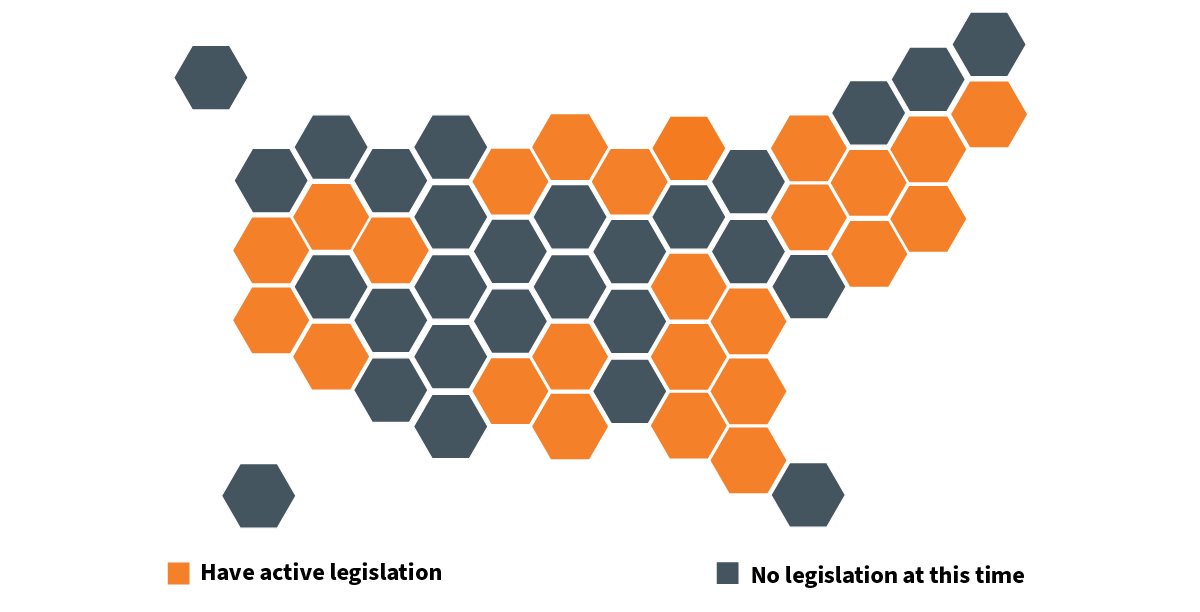Updated Virginia pass-through entity tax (PTET) guidance
The Commonwealth of Virginia has published updated guidelines to help taxpayers filing under Virginia’s pass-through entity tax (PTET).

On Jan. 4, 2024, the Commonwealth of Virginia (Commonwealth or State) published updated guidelines (Updated Guidelines) to aid taxpayers in filing under Virginia’s PTET regime. This final guidance addresses comments made by the public regarding the Virginia PTET, provides information on how to make the PTET election, and includes updated instructions to properly claim the PTET credit. This guidance was originally released in draft form on Oct. 31, 2022 (Original Guidelines). After a public comment period, the Commonwealth has finalized this guidance with a summary of the following highlights below.
PTET Election and Estimated Tax Payments
Electing pass-through entities (PTEs) may opt into the Virginia PTET by:
- Making an estimated payment of PTET for the tax year in which the election is sought
- Making an extension payment of PTET for the tax year in which the election is sought
- Filing a PTET return via Form 502PTET on or before the extended due date for the tax year in which the election is sought
An electing entity may revoke their election during the course of any estimated or extension payments made so long as Form 502PTET has not yet been filed. Once the Form 502PTET is filed, the Commonwealth will treat the PTET election as binding for that tax year.
Any PTE is permitted to make the election; however, only the pro-rata or distributive share of income, loss, gain, or deduction attributable to “eligible owners” of the PTE will be subject to the PTET. This is an update from the Original Guidelines, which provided that only PTEs that were 100% owned by natural persons, or persons eligible to be shareholders of an S Corporation, were eligible to make a PTET election. This requirement was eliminated in 2023 with the passage of Virginia House Bill 1456/Senate Bill 1476, other provisions of which are reflected in the Updated Guidelines.
An “eligible owner” is a direct owner of the PTE who is a natural person or an estate or trust. In this instance, a “natural person” includes federal disregarded entities (DREs) such as grantor trusts and single member limited liability companies, so long as the DRE is 100% owned by an individual.
All filings and payments for the PTET can be made electronically; however, the Form 502PTET return can only be filed electronically with no available exceptions. Form 502PTET is due by the fifteenth day of the fourth month following the close of the tax year. There is no separate state filing extension required, as Virginia provides an automatic six-month extension. However, if less than 90% of the PTET liability was paid by the original due date, an extension penalty will apply at a rate of 2% per month of the underpaid tax as of the original due date not to exceed 12% in total.
For tax years after 2022, an electing PTE is required to make estimated payments if it reasonably expects their PTET liability will exceed $1,000. Failure to make timely estimates may result in underpayment penalties unless:
- The PTE made estimated payments that are greater than or equal to its prior-year PTET liability. To claim this exception, the PTE must have filed a PTET return in the prior year that covered 12 months.
- The PTE made estimated payments that are greater than or equal to its current year PTET liability, if recalculated based on the facts shown on the prior year’s PTET return. Again, to claim this exception, the PTE must have filed a PTET return in the prior year that covered 12 months.
- The PTE meets an annualized income exception.
Allocation and Apportionment
While electing PTEs include all items of income, loss, gain, or deduction attributable to eligible owners in PTET taxable income, in limited circumstances entities may exclude amounts from such to the extent they are allocable to an eligible owner who is not subject to Virginia income tax on these amounts.; For example:
- Income that is not U.S.-sourced and is allocable to nonresident alien partners and, therefore, is not included in federal adjusted gross income under the Internal Revenue Code
- Retirement income of former partners that is exempt from nonresident state taxation under 4 U.S.C Section 114
The Updated Guidelines continue to require the PTET to calculate the Virginia resident eligible owners’ share of PTET liability based on their share of the electing PTE’s income or loss after all state modifications. This should be done without regard to the amount subject to PTE’s state apportionment.
In the case of Virginia nonresident eligible owners, their share of PTET liability is calculated on the share of elected PTE income or loss after state modifications subject to the PTE’s Virginia apportionment percentage. The electing entity would then add each eligible owner’s share of dividend income to this amount, if the electing entity is commercially domiciled in Virginia regardless of their state of residency.
This disparity between resident and nonresident eligible owners may potentially create a disproportionate allocation of such PTET liability and related credits between such owners without any sort of available true-up mechanism. In light of this, the operating agreements of partnership PTEs impacted due to having both resident and nonresident eligible owners should be reviewed and potentially amended for the ability to implement special allocations or otherwise allow for the true-up of capital accounts between such owners as needed.
Special Alternative Apportionment Option for Certain S Corporations
Unlike non-corporate limited liability companies and partnerships, S Corporations with both resident and nonresident eligible owners have the option to compute PTET taxable income as if all eligible owners are nonresidents (i.e. only the apportioned Virginia taxable income would be subject to PTET for both Virginia resident and nonresident eligible owners). In determining the share of income or loss that is attributable to Virginia for purposes of this optional calculation method, the S Corporation must add each of the owners’ share of income or loss (other than dividend income), multiplied by the electing entity’s apportionment percentage. The electing entity would then add each eligible owner’s share of dividend income to this amount, if the electing entity is commercially domiciled in Virginia.
PTET Credit
The Updated Guidelines clarify how to claim the PTET credit, specifying that an electing PTE is not permitted to distribute a PTET credit to ineligible owners. Furthermore, the amount of allowable PTET credit that inures to an eligible owner is equal to the amount of PTET paid by the electing PTE on the income distributed to such owner. Thus, the PTET credit is allocated to nonresident owners based on their distributive or pro rata share of income attributable to the Commonwealth. If the electing entity has total PTET income of zero or less, then no eligible owners are entitled to a PTET credit. Instead, the electing entity must file a Form 502PTET to request a refund of any PTET estimated tax payments made for that tax year.
The Commonwealth clarified that for tax years 2021-2025 in which the elective PTET is in effect, taxpayers may claim a nonrefundable Credit for Taxes Paid to Other States (CTPOS) on their Virginia individual income tax return, so long as the other state’s PTET is “substantially similar” to Virginia. Also, the CTPOS available to Virginia resident eligible owners is limited to the amount of out of state PTE income taxed at Virginia’s 5.75% individual income tax rate.
In “reciprocity” or “reverse credit” states, a Virginia resident typically claims an “Out-Of-State Credit” on that state’s nonresident income tax return for Virginia income taxes paid on the “Out-Of-State” income, and forgoes the CTPOS on that Virginia resident’s Virginia income tax return. Residents of such reciprocity states typically receive the same treatment for their Virginia sourced income: An Out-Of-State Credit in Virginia for their resident state income taxes paid on Virginia income, and no CTPOS in their resident state.
Of these reciprocity/reverse credit states, there are three with a substantially similar PTET: California, Arizona, and Oregon. Virginia residents may not claim a CTPOS for PTET paid in these states. Instead, they will claim the Virginia PTET on their Arizona, California, or Oregon PTET returns. If, however, these states do not allow an out-of-state credit for PTET paid to Virginia, the Virginia resident may then claim a credit on their return so long as they have provided proof to the Department of Taxation of the disallowance.
What does CohnReznick think?
With the change in qualifying entity rules, Virginia’s PTET will more closely mirror PTET as administered in other states. Special attention should be applied to electing PTEs involving a combination of Virginia resident and nonresident individual owners to address the disparate allocation of the PTET credit with respect to eligible owners’ capital accounts. S Corporations have an ability to make the alternative apportionment election discussed above to equally apply Virginia apportioned PTE income after state modifications to all shareholders in calculating their share of PTET liability. However, such option is not available to PTEs that are not S Corporations. These guidelines represent the Virginia Department of Taxation’s interpretation of the underlying laws, so do not carry the weight of statutory or regulatory language, but Taxpayers that rely on them may be treated as relying on erroneous written advice for purposes of waiving applicable penalties and interest.

Jason Gajramsingh

Cassandra Baubie
Looking for the full list of our dedicated professionals here at CohnReznick?
Contact
Let’s start a conversation about your company’s strategic goals and vision for the future.
Please fill all required fields*
Please verify your information and check to see if all require fields have been filled in.
Related services
Our solutions are tailored to each client’s strategic business drivers, technologies, corporate structure, and culture.
Any advice contained in this communication, including attachments and enclosures, is not intended as a thorough, in-depth analysis of specific issues. Nor is it sufficient to avoid tax-related penalties. This has been prepared for information purposes and general guidance only and does not constitute legal or professional advice. You should not act upon the information contained in this publication without obtaining specific professional advice specific to, among other things, your individual facts, circumstances and jurisdiction. No representation or warranty (express or implied) is made as to the accuracy or completeness of the information contained in this publication, and CohnReznick, its partners, employees and agents accept no liability, and disclaim all responsibility, for the consequences of you or anyone else acting, or refraining to act, in reliance on the information contained in this publication or for any decision based on it.














